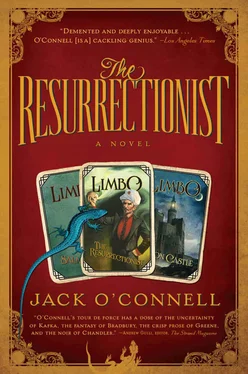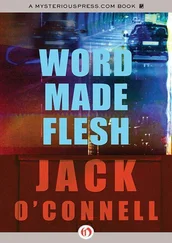Jack O'Connell - The Resurrectionist
Здесь есть возможность читать онлайн «Jack O'Connell - The Resurrectionist» весь текст электронной книги совершенно бесплатно (целиком полную версию без сокращений). В некоторых случаях можно слушать аудио, скачать через торрент в формате fb2 и присутствует краткое содержание. Год выпуска: 2009, Издательство: Algonquin Books, Жанр: Современная проза, на английском языке. Описание произведения, (предисловие) а так же отзывы посетителей доступны на портале библиотеки ЛибКат.
- Название:The Resurrectionist
- Автор:
- Издательство:Algonquin Books
- Жанр:
- Год:2009
- ISBN:нет данных
- Рейтинг книги:4 / 5. Голосов: 1
-
Избранное:Добавить в избранное
- Отзывы:
-
Ваша оценка:
- 80
- 1
- 2
- 3
- 4
- 5
The Resurrectionist: краткое содержание, описание и аннотация
Предлагаем к чтению аннотацию, описание, краткое содержание или предисловие (зависит от того, что написал сам автор книги «The Resurrectionist»). Если вы не нашли необходимую информацию о книге — напишите в комментариях, мы постараемся отыскать её.
those who create them and those who consume them. About the nature of consciousness and the power of the unknown. And, ultimately, about forgiveness and the depth of our need to extend it and receive it.
The Resurrectionist — читать онлайн бесплатно полную книгу (весь текст) целиком
Ниже представлен текст книги, разбитый по страницам. Система сохранения места последней прочитанной страницы, позволяет с удобством читать онлайн бесплатно книгу «The Resurrectionist», без необходимости каждый раз заново искать на чём Вы остановились. Поставьте закладку, и сможете в любой момент перейти на страницу, на которой закончили чтение.
Интервал:
Закладка:
It was a stupid thing to say and he was embarrassed it had slipped out. They gave up a few seconds of silence and drank their wine. Sweeney clinked his crystal against his plate as he set the glass back on the table.
“Well,” Alice said. “I’m in the same position.”
He looked across the table at her and she smiled. And then it dawned on her what she’d said. She brought a hand to her mouth, then took it away.
“I’m so sorry,” she said. “Of course, I’m not in the same position at all. I didn’t mean—”
“It’s okay,” Sweeney said. “Relax.”
“That was a foolish thing to say,” she said. “What I meant was there’s no one to. .”
He started to let her struggle and realized he didn’t want that.
“No heir,” he said. “You meant that there’s no heir. No one to carry on the Peck tradition.”
She nodded, shook her head, tilted it back.
“You can see,” she said, “why I dine alone.”
“I can see,” he said, and pointed with his fork to the portraits rimming the room, “why tradition could be a concern.”
Alice smiled, and it seemed genuine and grateful. She brought her napkin up from her lap and dabbed at her lips and said, “Can we start over?”
“There’s no need,” Sweeney said. “We’re doing fine.”
Then she surprised him by saying, “So what really happened to your hands?”
He forked a stalk of asparagus and said, “Told you. I fell down in the parking lot. But in case you’re worried, I’m not going to sue.”
“You looked like you were having some difficulties this morning.”
“I’m not a morning person,” he said. “So why won’t there be any Peck heirs?”
His question was a little harsh, maybe, but it sent the right message — we both have things we don’t want to discuss. She finished the wine in her glass and said, “I should’ve brought the bottle in.”
Sweeney rose and said, “Allow me,” and Alice didn’t object. He pushed through the swinging door and into the kitchen. It was large and old. Soapstone sinks and wainscoting and bad lighting. The Merlot was sitting next to a greasy roasting pan that held the rest of the chops. He grabbed the wine, moved back into the dining room, and filled Alice’s glass to just below the brim.
He returned to his seat, topped off his glass and said, “You come up with an answer yet?”
“Nothing witty,” she said. “Just the truth.”
“And that is?”
“That the days when you could be married to medicine and raise a family on the side are gone.”
“I knew a lot of doctors back in Ohio,” Sweeney said. “And most of them were married and had kids.”
Alice shrugged. “There’s practicing medicine,” she said. “And then there’s the way the Pecks practice medicine.”
Sweeney put on a mock grimace and said, “Excuse me.” The wine made the words more sarcastic than he’d intended.
“I know what that sounds like,” Alice said. “But like my father told me on my first day of med school, obsession is a requirement.”
“And you still think Dad is right?”
“I know he’s right,” all kidding and flirting gone from her voice suddenly. “My father’s always right.”
Sweeney stayed silent, let the last words hang there, hoping she’d laugh at them. Instead, Alice continued.
“We’re not bonesetters, Sweeney. We’re out on the edge. Part of what my father and I do, maybe the most important part of what we do, is draw maps of the human mind. Our patients are helping us redefine beliefs about consciousness. Where it begins and where it ends and what it is.”
“I’m glad,” Sweeney said, “that Danny could assist you.”
It was a snide comment but she’d been running toward pompous and he didn’t like it. It made her resemble her father.
“I’m not trying to hurt you or offend you,” she said. “And I’m certainly not trying to hurt your son. But you came to us because we’re doing things that no one else in the field is doing.”
“I came to you,” Sweeney said, “because I was told you could help my son. I don’t care what you do or don’t discover in the process. And you don’t have to talk to me like I’m on some grant committee.”
“We don’t take a dime,” she said, rigid now, as if it were a point of honor, “from the federal government. Or from any private foundations. Or from the drug companies. We’re funded exclusively by patients’ fees, contributions, and the Peck Family Trust.”
He’d touched some kind of nerve so he probed a little.
“And the reason for that would be?”
She looked at him as if the answer were obvious.
“We’re not beholden to anyone,” she said. “Outside of fulfilling our licensing and accreditation requirements, we can run the Clinic as we see fit.”
“So independence is important to you,” he said.
“In this area of research,” preaching now, “it’s crucial.”
He worked his tongue to free a piece of gristle from between two teeth, then said, “Why?”
She repeated the word and he nodded and said, “I don’t mean any disrespect, Alice. I really don’t. But for almost a year now I’ve been hearing about this place. People talk in a kind of reverent way about the Peck”—she smiled at that—“like it’s Lourdes, or something. Dr. Lawton said if I could get Danny into the Peck, I shouldn’t hesitate. I had to go. So I read everything I could find on you people and I made application. And now here I am, and Danny’s got a bed, and I’m having dinner with his neurologist. And I’ve still got no idea why this place is considered the Mecca.”
“But you know about our results—” she began and he cut her off.
“You’ve had two arousals,” he said.
She squinted at him, as if he’d wandered into a language she couldn’t comprehend.
“That’s right,” she said. “And they were both persistent and semivegetative cases.”
“And how do you know you were responsible for those wakings?”
“How do we know?” she said, stunned by the recklessness of the question. “For God’s sake, we’re scientists, Sweeney. We monitor our results scrupulously. We test and retest. We don’t make claims we can’t validate.”
“Then why haven’t the full case studies been published?”
“They will be published,” she said. “Of course they’ll be published. But there are procedures. These things take a lot of time. For precisely that reason, so results can be confirmed definitively. So we don’t give false hope.”
“I understand that,” he said, more frustrated than he expected. “And I’m not suggesting the arousals were spontaneous. I’m sure they weren’t. But you said yourself that your patients are helping you redefine your techniques—”
“Beliefs,” she corrected. “I said beliefs.”
He hurried so he wouldn’t lose the thought.
“And my son is one of those patients now. And I have no idea what your beliefs, or your techniques for that matter, are. I’m his father. And I have no idea. What are you doing here that isn’t being done elsewhere?”
She looked at him for a while as if trying to decide something, then took her napkin from her lap and put it on the table. She looked at her wristwatch and said, “You’re not working tonight?”
He shook his head.
“Then let’s do this,” she said. “I’ll clear the plates and you go into the living room and pour a couple of brandies and we’ll talk some more.”
She got up and started collecting the china before he could answer.
The living room was off the other side of the foyer. There were no ancestors here, but hung over the mantel was a gargantuan photo of the Clinic, matted and framed, pressed under heavy glass and dating, Sweeney guessed, from the turn of the last century. The building had been photographed at either dawn or dusk and the trees that today surrounded it had yet to be planted. As a result, the picture looked like a still from some early German horror film and he wondered what would possess anyone to make it the showpiece of the room.
Читать дальшеИнтервал:
Закладка:
Похожие книги на «The Resurrectionist»
Представляем Вашему вниманию похожие книги на «The Resurrectionist» списком для выбора. Мы отобрали схожую по названию и смыслу литературу в надежде предоставить читателям больше вариантов отыскать новые, интересные, ещё непрочитанные произведения.
Обсуждение, отзывы о книге «The Resurrectionist» и просто собственные мнения читателей. Оставьте ваши комментарии, напишите, что Вы думаете о произведении, его смысле или главных героях. Укажите что конкретно понравилось, а что нет, и почему Вы так считаете.












